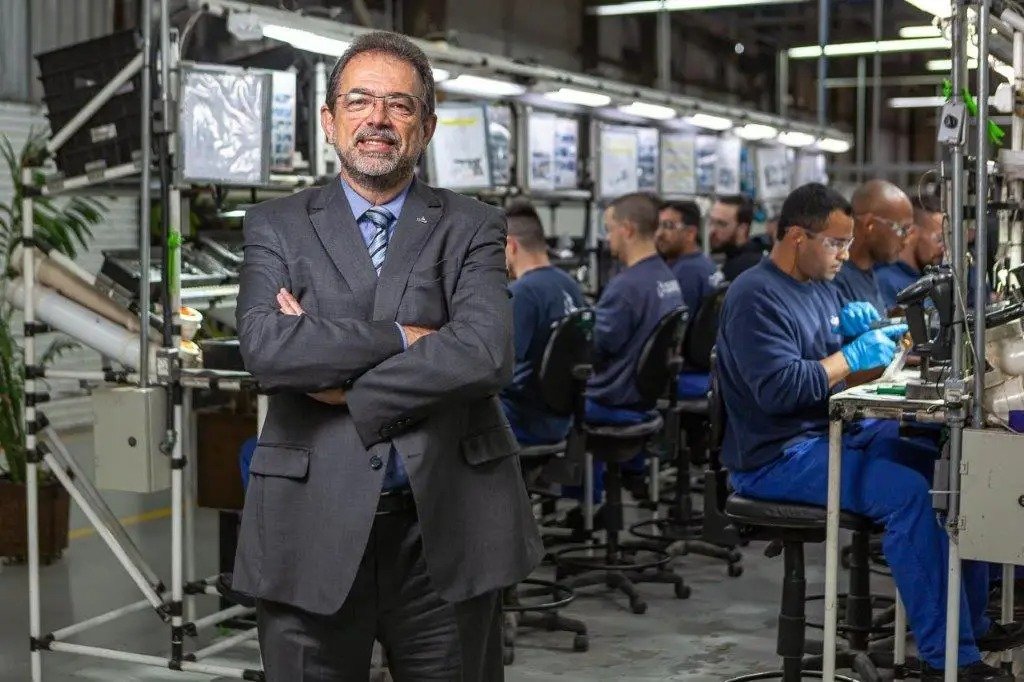Founded in 1939, Taurus (formerly Forjas Taurus) was established by Getúlio Vargas to strengthen the industry and defense capabilities in Brazil. In 1950, the company transitioned to an American entity after being acquired by Smith & Wesson.
In the 1970s, he re-emerged as a Brazilian businessman. By merging and acquiring companies, he grew into a major player in the defense industry. Now under the ownership of CBC (Brazilian Cartridge Company), the company manufactures over 2,000 firearms daily and sells them to over 100 countries.
Since 2018, the 65-year-old Salesio Nuhs has effectively guided the company through various challenges, leading it back to profitability. However, Taurus now confronts a fresh test in the form of a 50% tariff on Brazilian products imposed by US President Donald Trump, despite gaining investor interest during Jair Bolsonaro’s administration.
With 77.2% of its earnings coming from the US market, compared to 11.4% from Brazil, the revolver manufacturer quickly increased shipments of products and parts from its São Leopoldo factory in Rio Grande do Sul in the last quarter. This move was to prevent any negative impacts of the tariff that came into effect in August, resulting in the establishment of a 90-day stockpile.
The CEO of Taurus mentioned having a 90-day stock in the US, with most of it not being taxed and a smaller portion being taxed at less than 10%. They have been sending goods to the US with a 10% fee since April but have not adjusted prices at the point of sale within the quarter. In an attempt to mitigate the impact of the tax rate, they even raised prices by 7% in July.
Taurus planned to mitigate the impact of the exchange rate by exporting loaders and parts to the US and will start assembling a portion of its main G family firearms line in the US from September.
The strategy to produce the G family in the US ensures a successful year without setbacks, even with the tariff in place until the year-end. This approach was carefully planned to safeguard the company’s outcomes.
impact of the dollar
The company’s net debt increased significantly by 78% in the second quarter of this year compared to the same period in 2024. This rise was driven by a boost of R $ 76 million in receivable accounts and an advance of R $ 73 million in stock costs, impacting the cash flow in the first half of the year. However, Nuhs is not concerned as the debt profile remains unchanged, consisting of long-term spaced debt, which is considered favorable.
The company’s balance was affected by the dollar’s volatility, according to Research analyst Malek Zein. He mentioned that the company’s stocks went up and its debt increased, but it would still make a profit even without the changes in exchange rates.

Legal advocacy
Taurus sought assistance from Ballard Partners, a US advocacy firm that also serves other national companies like Embraer, to mitigate the impact of Trump’s tax policies. This collaboration led to a meeting with the team of US Vice President J.D. Vance.
The US recently granted exemptions for Brazilian imports, excluding weapons as essential items. The CEO of Taurus anticipates additional exemptions aligning with American regional interests.
The company has ongoing communication with Georgia Governor Brian Kemp, with whom they have a factory. The manufacturing complex in Georgia, established in 2019 with a $42 million investment, includes state incentives. Previously, the company operated in Florida, but after relocating to Georgia, they were able to double their production capacity to 800,000 weapons annually from 400,000.
The Georgian government took steps to relocate us from Florida, as they have invested in Taurus and value our presence, according to the CEO. The executive is scheduled to meet with the governor of Georgia on August 26.
In Brazil, Nuhs has already engaged with individuals associated with BNDES, Vice President Geraldo Alckmin, and Defense Minister José Mucio. However, the governor of Rio Grande do Sul, Eduardo Leite, has shown more interest. Nuhs highlighted that they have demonstrated ICMS credits that Governor Leite is already granting to them.
The executive viewed the US tax rate on Brazil as a combination of economic, political, and ideological factors. He expressed optimism that this rate would be reevaluated.

